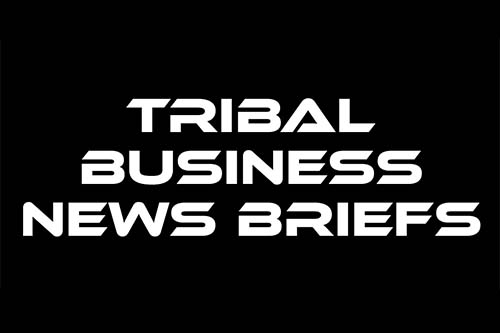Here is a round-up of business news from around Indian Country.

Broadband
• The National Telecommunications and Information Administration within the U.S. Department of Commerce awarded additional grants totalling nearly $1.2 million to four tribes in California, Washington and Wisconsin to use to build-out reliable broadband connectivity. The awards come as part of the $980 million Tribal Broadband Connectivity Program, which was funded by the Consolidated Appropriations Act of 2021. “NTIA’s Tribal Broadband Connectivity Program is playing a crucial role in meeting the mission and closing the digital divide by expanding internet access to tribal communities and connecting them to schools, health care services, business opportunities and more,” Alan Davidson, Assistant Secretary of Commerce for Communications and Information, said in a statement. The recently enacted Bipartisan Infrastructure Law will add an additional $2 billion to the program. The funded projects include:
-
- The Cabazon Band of Mission Indians in Indio, Calif. will invest $320,000 to install fiber to connect 17 unserved Native American households with qualifying broadband service.
- The Forest County Potawatomi Community in Crandon, Wis. will leverage $125,000 for a Community Solar Broadband Project, which will get broadband service to the tribe’s critical solar arrays.
- The Port Gamble S’Klallam Tribe in Kingston, Wash. will invest $443,000 to construct aerial fiber and underground Fiber-to-the-Home to 69 unserved households, in addition to 118 households that are under construction and scheduled for occupancy in early 2022.
- The St. Croix Chippewa Indians in Webster, Wis. will invest $302,000 to install last-mile fiber intended to bring broadband to unserved Native American households, businesses and community anchor institutions in the tribal community of Round Lake.
Funding
• Three American Indian tribes in Minnesota will split nearly $4.2 million in federal funding for a range of small business, public safety and energy projects. In particular, the Mille Lacs Band of Ojibwe will receive $1.3 million to build the Mille Lacs Tribal Economy Business Incubator that’s aimed at providing Native-owned businesses with various support and technical services. “Small businesses are driving the rebirth of our economy after the pandemic and are responsible for creating two-thirds of all new jobs in the United States. With a focus on supporting entrepreneurs and showcasing their gifts, this business incubator project is a game-changer with the potential to spur the entire regional economy,” Mille Lacs of Band of Ojibwe Chief Executive Melanie Benjamin said in a statement, describing the investment as a “critical project that will benefit east-central Minnesota.” Additionally, the Fond du Lac Band of Lake Superior Chippewa will receive $2.7 million for a new law enforcement and emergency management building, while the Grand Portage Band of Lake Superior Chippewa will receive $157,000 to upgrade the 28-year-old boiler/propane heating system at the Grand Portage Community Center. The funding was announced by Minnesota Sens. Amy Klobuchar and Tina Smith, both Democrats. Smith is a member of the Senate Committee on Indian Affairs.
Law
• Sarah Roubidoux Lawson, an enrolled member of the Iowa Tribe of Kansas and Nebraska and a shareholder at the Seattle, Wash.-based law firm Schwabe, Williamson & Wyatt PC, was appointed to a six-year term on the Washington State Gambling Commission by Gov. Jay Inslee. Roubidoux Lawson also received an appointment to Chief Judge of the Stillaguamish Tribal Court from the tribe’s board of directors. The Washington State Gambling Commission, a limited-jurisdiction law enforcement agency, makes policy and budget decisions and acts on administrative gambling issues. Meanwhile, as Chief Judge, Roubidoux Lawson will hear criminal and civil cases regarding the Stillaguamish Code of Laws. The appointment to the bench has no set expiration date. “Thank you to the Stillaguamish Tribal Council for putting their faith in me to serve as Chief Judge and preside over their Tribal Court,” Roubidoux Lawson said in a statement. “It’s an honor to work closely with the Stillaguamish community and fill a crucial role for the Tribe’s legal system.” In her legal practice, Roubidoux Lawson works on cases related to tribal self-governance, economic development and sovereignty, with a special focus on tribal tax and real estate.
Gaming
• The Federated Indians of Graton Rancheria have detailed plans to expand the Graton Resort and Casino by increasing the gaming floor by 50 percent or 144,000 square feet and adding a 221-room hotel tower, according to a report in the Press Democrat. The existing facility includes 3,000 slot machines plus table games and a 200-room hotel, convention space and ballroom. The existing tribal casino employs more than 2,000 people. The plans were first detailed in a filing with nearby Rohnert Park, according to the report.
Construction
• Kalamazoo, Mich.-based Seven Generations Architecture + Engineering (7GAE), part of the Bodwé Professional Services Group at Mno-Bmadsen, the non-gaming arm of the Pokagon Band of Potawatomi, has hired tribal citizen Steve Zimmerman to serve as director of construction services. Miller has more than 20 years of experience in construction, commissioning and estimating and most recently served as the preconstruction services director and chief estimator at Miller-Davis Co. in Kalamazoo. “I have been following 7GAE since its inception,” Zimmerman said in a statement. “As a Pokagon citizen, I am looking forward to working for a Potawatomi Band business enterprise to serve tribal communities locally and across the country. I am also looking forward to the satisfaction that comes from seeing projects through to completion, as estimating limited my access to that enriching experience.” At 7GAE, Zimmerman will lead the firm’s preconstruction and construction administration efforts.
